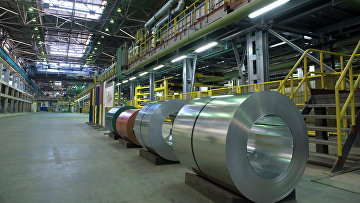
the Resignation of the Russian government Prime Minister Dmitry Medvedev last week was a surprise for German companies doing business in Russia. But only a few of them decided to assess the possible consequences of this resignation to their activities. CEOs can, in principle, to rely on further long-term cooperation with Vladimir Putin, the current President, who after the end of the presidential term in 2024 will not want to release the power.
the Russian economy is in stagnation, after Russia in the spring of 2014 annexed the Ukrainian Peninsula of Crimea and the West in response to the imposed against Russia sanctions. In addition, the constantly declining price of oil. Not the most favorable conditions for business, but it is the German companies play an important role in it.
According to the Russian-German chamber of Commerce (AHK) in the first nine months of 2019 Germany was the second largest trade partner after China. However, the share of Germany in the Russian foreign trade in the first three quarters of 2019 has decreased almost on 1% — to the level of 7.9%. “The main reason is the reduction of the export price of Russian raw materials, — says the Russian-German chamber of Commerce, — while Russian exports to Germany fell by 18%, imports from Germany fell by only 5%. Russia buys first German machines, vehicles and chemical products.”
According to the Russian-German chamber of Commerce, of the 50 foreign companies in Russia nine German. This data is 2018, the new information yet. Here is a list of German companies with the highest turnover:
1. Volkswagen (Volkswagen): the trade turnover in Russia amounts to 4.1 billion euros.
2. “Metro the Cache end Kerri” (Metro Cash&Carry): 3.08 billion.
3. Daimler AG (Daimler): 2.1 billion euros.
4. “BMW” (BMW): 1.75 billion euros
5. Globus (Globus): 1.3 billion euros
6. “Juniper” (Uniper): 1.15 billion euros
7. Henkel (Henkel): 1.1 billion euros
8. “Bayer” (Bayer): 0,8 billion euros
9. “Obi” (Obi): 0.7 billion euros
the Newspaper WirtschaftsWoche asked these nine companies to comment on the resignation of the Russian government. The responses were pretty restrained. Chemical concern Bayer did not reply. Saar supermarket chain Globus, the car maker Daimler AG and a network of building hypermarkets “Obi” reported that nothing I can say about it. The düsseldorf specialist in detergents and adhesives “Henkel”, operating in Russia since 1990, was only pointing out a value for it in the local market after the USA and China, Russia was for “Henkel” in 2018 the third most important market outside Western Europe.
the Context Forbes: to succeed in Russia, it is necessary понятьForbes13.01.2020 Bloomberg: US business groups warn about the dangers of anti-санкцийBloomberg18.12.2019Е15: it is good that the Czech businessmen “burned” in Россиие15.cz02.12.2019
Forbes: to succeed in Russia, it is necessary понятьForbes13.01.2020 Bloomberg: US business groups warn about the dangers of anti-санкцийBloomberg18.12.2019Е15: it is good that the Czech businessmen “burned” in Россиие15.cz02.12.2019
“BMW” (turnover of 97.5 billion euros) would not comment on politics in Russia, but only pointed to market growth: they increased the sales Russia in the last five years, from 28.8 thousand cars in 2014 to 44 million in 2019.
Official representative of “Volkswagen” (turnover amounting to 235.8 billion euros) said: “the Business of Volkswagen in Russia is developing positively. We managed to reverse the situation and re-enter a plus”. Chef “Volkswagen” Herbert Diss (Herbert Diess) during the so-called Global Board Meeting last week in Berlin said: “in Russia we achieved a turnaround in the business.” In the period from 2017 to 2018, Volkswagen increased deliveries to Russia by 20.6% (209 261 car). Last year, as announced by Volkswagen, supply in Russia has been developing positively, and “therefore was able to significantly increase our share in a declining market.”
Business in Russia negatively affects the performance Metro
the Second turnover of the German company in Russia — düsseldorf wholesale trading network “Metro” (27 billion euros). Her business in Russia in past years has been primarily a “challenge” as chief Metro Olaf Koch (Olaf Koch) in December. In fiscal year 2019-2020 (from October 2019 to September 2024) Koch expects profits fall by 20-30 million euros, last year this figure amounted to almost 40 million euros. In Russia the turnover of the “Metro” in the past financial year amounted to about 2,7 billion euros a year earlier — more than 2.8 billion.
At the request WirtschaftsWoche in the “Metro” said: “For our business in the Russian content policy and the political and legal framework conditions for obvious ifranks more important than personnel decisions”. On what he expects the “Metro” from the new Russian government, the official representative of the group said: “We want a consistent practical realization of planned policy priorities, including increasing economic growth, reducing bureaucratic barriers, development of small and medium business”.
On the Russian market the company’s attention is focused when the former chefs of “Metro” Hans-Joachim Kerber a (Joachim Körber, 2001-2007) and the Eckhard Cordes (Eckhard Cordes, 2007-2011). Eckhard Cordes was the Chairman of the Economic Union of the Eastern Committee of German economy (where he still sits on the podium next to the present chief “Metro” Koch). He actively participated in the forum “Petersburg dialogue”. The first “Metro” hypermarket in Russia Kerber opened in 2001. Today “Metro” is 94 hypermarkets across Russia, including 12 in Moscow. The latter was opened by the mayor Sergei Sobyanin in July 2019. Thus, Russia became the “Metro” the second most important foreign market after France (where 98 hypermarkets).
In recent years concern “Subway” in Russia lost a lot of turnover. Today, however, business in Russia profitable, according to the concern. There have recently felt the “change of trend”. This year, the company expects that “will consistently pursue the measures to improve the trend.” The group said that Russia remains “Underground”, “important but difficult market. Especially small traders, we support the recommendations service, high quality products and our franchisenovel concept Fasol. All these measures should help them establish themselves successfully in a dynamic retail trade. We hope that the government will strengthen the position primarily small and medium-sized businesses, such as merchants and groceries, and the country gets back on the path of sustainable economic development”.
Energy company “Juniper” in front of a hostile takeover
the Düsseldorf energy company “Juniper” (the turnover of 78 billion euros), a splinter from energy company “EON” (Eon), conducts an active business in Russia, mainly through the energy company “Yunipro” in which the “Juniper” owns a controlling stake. Electricity produced five power plants: one works on brown coal, four gas-and coal. According to the “Juniper”, accounting for 5% of total electricity production in Russia.
in Addition, “Juniper” Finance in Russia the problem of the Baltic pipeline “Nord stream — 2”, “energy logic, which we remain convinced”, according to the company itself. The resignation of the government a press-service “Juniper” commented as follows: “within the framework of a long-term business activities in Russia, we always cooperate with every Russian government in an atmosphere of complete trust.”
However, the “Juniper” there are reasons to consider cooperation with the Federal Antimonopoly service of Russia (FAS) are somewhat more critical. FAS for a long time, a special prohibition has blocked a hostile takeover “Juniper” Finnish energy company Fortum, and at the end of last year is connected to the case amendment in the law relating to investment by foreign state corporations in Russia. “Fortum” is a state concern. Central to the case of a takeover attempt is one of the Russian water utilities owned by “Juniper” and is in Russia of strategic purpose. Under the old legislation, foreign government corporations are not permitted to possess such items on the rights of the majority shareholders. But, apparently, the chief of “Fortum” Landmark Pekka (Pekka Lundmark) managed to solve the problem: in November of last year Russia, in principle, allowed the takeover. Lundmark talked about it on the sidelines of an economic congresses in St. Petersburg with Vladimir Putin — the current and likely future ruler of Russia.
the new York times contain estimates of the solely foreign media and do not reflect the views of the editorial Board of the new York times.
















